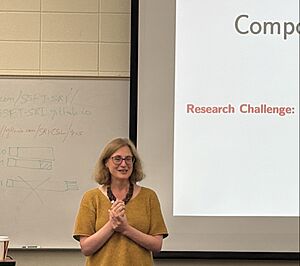Philippa Gardner facts for kids
Quick facts for kids
Philippa Anne Gardner
FREng FBCS
|
|
|---|---|
| Born | July 29, 1965 |
| Nationality | British |
| Alma mater |
|
| Awards | BCS Lovelace Medal (2024) |
| Scientific career | |
| Fields | |
| Institutions | Imperial College |
| Thesis | Representing Logics in Type Theory (1992) |
| Doctoral advisor | Gordon Plotkin |
Philippa Gardner is a brilliant British computer scientist and a professor at Imperial College London. She was born on July 29, 1965. Since 2009, she has been a Professor of Theoretical Computer Science. This means she studies the basic ideas behind how computers work and how to make them better. In 2020, she became a Fellow of the Royal Academy of Engineering, which is a big honor for engineers in the UK.
Contents
Early Life and Education
Growing Up in England
Philippa Gardner was born in Exeter, Devon, England, on July 29, 1965. She grew up with a keen interest in how things work, especially in the world of computers.
Her University Journey
In 1988, Philippa earned her Master of Science (MSc) degree from Bristol University. Her studies focused on logic and computation, which are important parts of computer science. She then continued her education at the University of Edinburgh. There, she worked on her PhD, which she completed in 1992. Her PhD paper was about "Representing Logics in Type Theory," a complex topic about how to describe different kinds of logic using special computer languages.
Career in Computer Science
Starting Her Research
After finishing her PhD, Philippa Gardner received a special fellowship at Cambridge University. She worked with another famous computer scientist, Robin Milner. From 1994 to 1996, she also held a research fellowship with The Royal Society of Edinburgh. These early experiences helped her become a leader in her field.
Becoming a Professor
In 2001, Philippa joined Imperial College London as a lecturer. She quickly showed her talent and dedication. By 2009, she was appointed Professor of Theoretical Computer Science. This is one of the highest positions a university can offer. From 2018 to 2023, she received a UKRI Established Fellowship, which supported her important research.
Leading Research and Teaching
Between 2013 and 2016, Professor Gardner directed a special research group. This group focused on "Automated Program Analysis and Verification." This means they worked on creating tools that can automatically check if computer programs are working correctly and safely. This research was supported by important organizations like GCHQ and the Engineering and Physical Sciences Research Council (EPSRC).
Philippa Gardner is also an excellent teacher and mentor. She won awards at Imperial College London for her teaching in 2013. In 2019, she received another award for being an outstanding supervisor for students doing research.
Her Current Work
Today, Professor Gardner's main research is about "program verification." This involves making sure computer programs are reliable and do exactly what they are supposed to do without errors. A big project she is working on is called Gillian. Gillian is a special platform that helps create tools to analyze computer programs. It helps make sure software is safe and works perfectly.
 | Emma Amos |
 | Edward Mitchell Bannister |
 | Larry D. Alexander |
 | Ernie Barnes |


